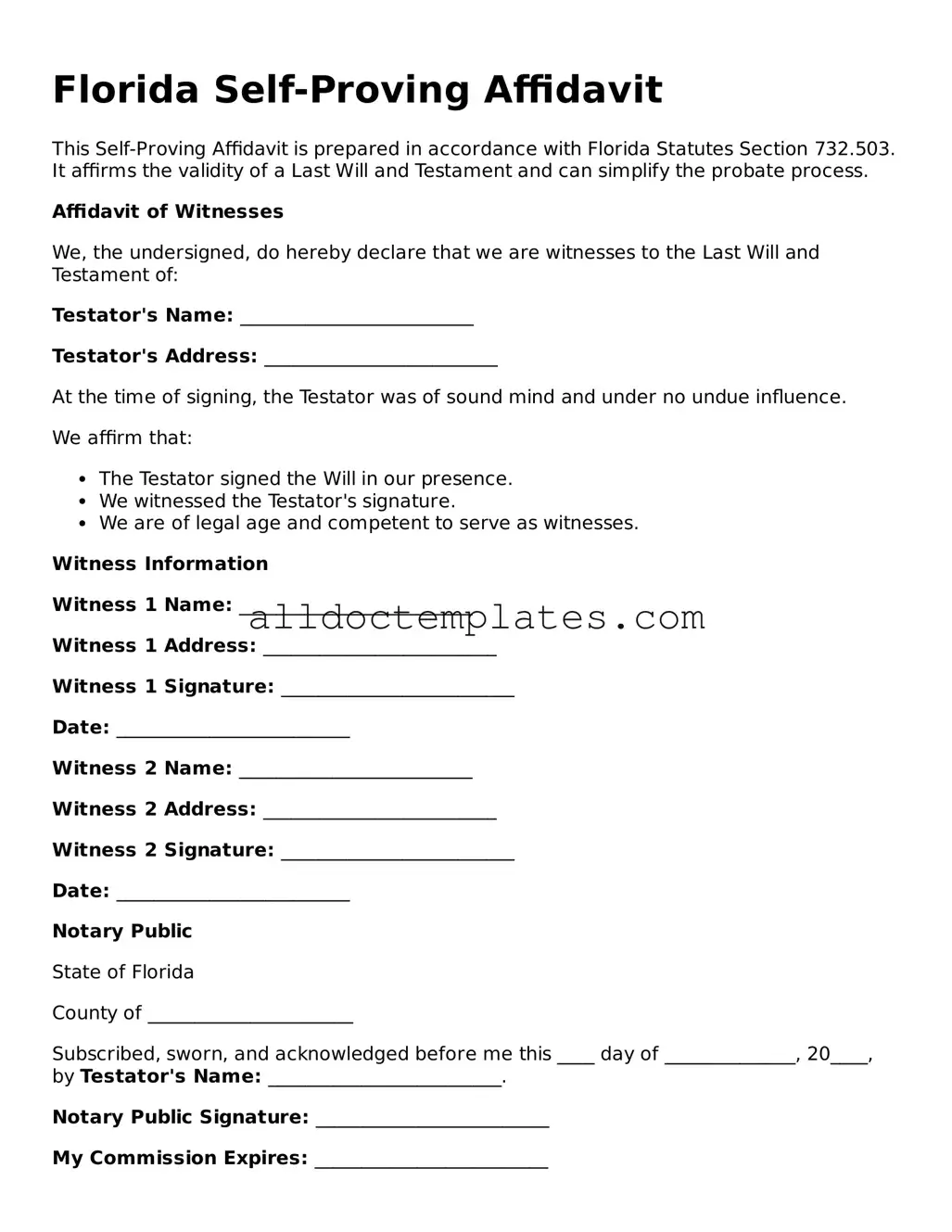Free Self-Proving Affidavit Document for Florida State
Document Sample
Florida Self-Proving Affidavit
This Self-Proving Affidavit is prepared in accordance with Florida Statutes Section 732.503. It affirms the validity of a Last Will and Testament and can simplify the probate process.
Affidavit of Witnesses
We, the undersigned, do hereby declare that we are witnesses to the Last Will and Testament of:
Testator's Name: _________________________
Testator's Address: _________________________
At the time of signing, the Testator was of sound mind and under no undue influence.
We affirm that:
- The Testator signed the Will in our presence.
- We witnessed the Testator's signature.
- We are of legal age and competent to serve as witnesses.
Witness Information
Witness 1 Name: _________________________
Witness 1 Address: _________________________
Witness 1 Signature: _________________________
Date: _________________________
Witness 2 Name: _________________________
Witness 2 Address: _________________________
Witness 2 Signature: _________________________
Date: _________________________
Notary Public
State of Florida
County of ______________________
Subscribed, sworn, and acknowledged before me this ____ day of ______________, 20____, by Testator's Name: _________________________.
Notary Public Signature: _________________________
My Commission Expires: _________________________
This Self-Proving Affidavit shall serve as proof of the Testator's intentions without the necessity of further testimony.
Form Data
| Fact Name | Details |
|---|---|
| Purpose | The Florida Self-Proving Affidavit allows a will to be validated without requiring witnesses to testify in court. |
| Governing Law | This form is governed by Florida Statutes, Section 732.503. |
| Requirements | The affidavit must be signed by the testator and two witnesses in the presence of a notary public. |
| Benefits | Using this affidavit simplifies the probate process and can expedite the administration of the estate. |
Florida Self-Proving Affidavit - Usage Guidelines
After gathering the necessary information, you can proceed to fill out the Florida Self-Proving Affidavit form. This form requires specific details about the will and the individuals involved. Follow these steps carefully to ensure accuracy.
- Begin by entering the name of the deceased individual, referred to as the "testator." This should be written clearly at the top of the form.
- Next, provide the date on which the will was executed. This is crucial for establishing the validity of the document.
- Identify the witnesses who were present during the signing of the will. You will need to include their full names and addresses.
- Each witness must then sign the affidavit. Ensure that they do this in the presence of a notary public.
- The notary public will also need to sign the form, confirming that they witnessed the signatures of both the testator and the witnesses.
- Finally, make sure to date the affidavit. This date should reflect when the notary public completed their part of the document.
Once completed, the form should be filed according to local requirements, ensuring that all parties involved have copies for their records.
Some Other Self-Proving Affidavit State Templates
Self Proving Will Texas - The self-proving affidavit can simplify legal processes significantly.
How to Fill Out an Affidavit - Witnesses who sign the affidavit declare they observed the will being signed.
When establishing a corporation in Colorado, it is important to utilize the proper legal documentation, such as the Articles of Incorporation form, which can be found through resources like Colorado PDF Templates, ensuring that you include all necessary information to properly register your business.
Self Proving Affidavit for Will - A Self-Proving Affidavit can help to avoid delays in executing the will's terms.
Dos and Don'ts
When filling out the Florida Self-Proving Affidavit form, it is important to follow certain guidelines to ensure the document is valid and effective. Here are nine things to keep in mind:
- Do ensure that the form is signed in the presence of a notary public.
- Do include the names of all witnesses who are signing the affidavit.
- Do provide accurate information about the testator and the will.
- Do check for any errors or omissions before submitting the form.
- Do keep a copy of the signed affidavit for your records.
- Don't forget to date the affidavit when signing.
- Don't sign the affidavit without the presence of the notary and witnesses.
- Don't use the form if the will has not been properly executed.
- Don't overlook the importance of clear and legible handwriting.
Common mistakes
-
Not Including Required Information: It's crucial to provide all necessary details, such as the names of the testators and witnesses. Missing even one name can lead to complications.
-
Improper Signatures: All parties must sign the affidavit in the correct order. If the testator or witnesses fail to sign properly, the document may not be valid.
-
Not Having Witnesses Present: The law requires that witnesses be present during the signing of the affidavit. If witnesses are not there, the affidavit could be challenged.
-
Failing to Notarize: A self-proving affidavit must be notarized to be legally binding. Skipping this step can render the document ineffective.
-
Using Incorrect Language: The language used in the affidavit should be clear and specific. Ambiguities can lead to misunderstandings or disputes later on.
-
Not Keeping Copies: After completing the affidavit, it’s important to keep copies for your records. Without them, proving the affidavit's existence can become difficult.
